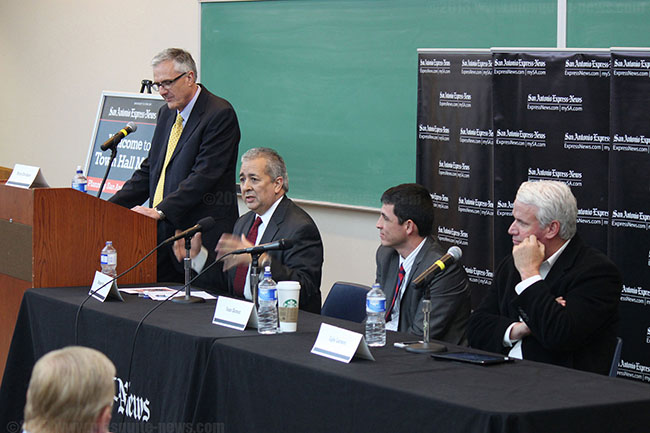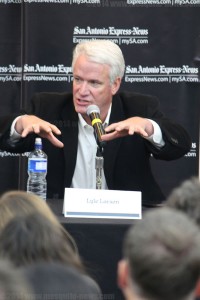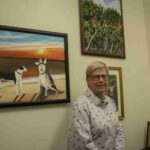
By Rebecca Salinas
The San Antonio Water System plans to expand a desalination plant to make use of salty water. SAWS President Robert Puente explained that expansion is a better option than piping in water from outside regions, the method under consideration by the company’s board of directors.
Desalination, the process of extracting excess salts and dissolved solids from saline water, is not a new term for Texans. There are more than 40 desalination plants spread across the state.
Puente addressed the issue in a townhall meeting, “Planning San Antonio’s Water Future” hosted by the San Antonio Express-News and the University of Texas at San Antonio Feb. 6. Other panelists included state Rep. Lyle Larson, R-District 122, and Juan Gomez, deputy director and associate professor of research for the UTSA Sustainable Energy Institute.
The board met Feb. 10 to discuss the three proposals to pipe water from outside regions, but no action was taken. The board feels more research should be conducted.
Panelists at the townhall meeting agreed the extension of the desalination helps plan for the future of Texas, rather than provide a temporary resolution. The expanded desalination plant would be located in southern Bexar County.
Puente said proposals to pipe 50,000 acre-feet of water per year from Dimmit and Val Verde counties to the City of San Antonio does not solve the problem because that water will eventually run out.
“We cannot have a situation where we are going to regret it 15-20 years from now,” he said.
Puente’s recommendation includes an extension of the already planned groundwater desalination plant with a partnership with CPS Energy. CPS would also co-locate a natural gas plant at the same location as the extended brackish desalination plant.

Brackish water, he said, is too salty for human consumption and agricultural use, but is easily treatable.
Larson said 10 years ago, people disliked the idea of using “bad water,” but now communities are considering the option because of the growing need for water and technology advances.
“Desalination is the answer all over the world,” he said, although it is a process that Texas is just starting to use.
Gomez agreed, explaining the United States should be one of the leaders in the desalination process given this country’s advanced technology and intelligence. He said Singapore, Australia and countries in the Middle East use treated seawater, and it’s effective.
“We need to take that leap of faith and be willing to invest in the 500 million or billions of dollars that is required to invest in those resources to be willing to pay today for the security and the safety for tomorrow,” Gomez said.
Although a drought recently ended in Texas, climatologists predict another 10-15 years of dry land.
“If we had another year left of the drought in 2011, it would have brought the state to its knees,” Larson said.
While 1,100 people are moving into Texas everyday, the land west of I-35 lost an average of 1 inch of rainfall per decade for the last 8 decades, he said.
“We have to change our culture and our practices to address that,” Larson said. “It is just a fact. It is going to stress all our systems.”
Communities cannot sit and wait for the aquifer to reach an attainable level, but rather conserve water every day, he said.
Gomez said water use is directly correlated with culture. He said people need to be willing to pay or conserve water if they want the resource, adding, “We are fairly spoiled. We are blessed and cursed at the same time.”
Water is available with turn of a faucet and electricity is available with a flip of a switch, so people do not have to think about it, he said. Gomez added people need to inform themselves about the scarcity of water.
“I am an engineer so I understand these systems enough, but at the same time I am always amazed at how complex they are,” he said. His point was technology can temporarily fix water problems, but not the culture of excessive water use.
Larson agreed, saying people tell him, “You can’t tell me what I can or can’t do,” when it comes to water regulations. He said people need to be considerate and cannot ignore these problems.
Larson gave an example of a hydraulic fracturing well versus a 20 acre corn field. He said they may use the same amount of water, but a fracturing well will have a much higher economic value.
“Can we deprive those folks from growing corn?…There is a balancing act that goes on,” Larson said.
Panelists agreed, communities, as well as data and technology, need to be the motivating factors, not politicians.
“We won’t understand it until we don’t have it, and then we will have 10,000 people beating down the door of San Antonio Water System CEO saying, ‘Why didn’t we do something sooner?’” Larson said.
Puente said SAWS would not have to fund water treatment projects, such as desalination, if they can convince customers to use less water.
He clarified SAWS does lose revenue when water is wasted due to aging infrastructure. He said pipes in the city are old, especially the ones downtown, but go unnoticed since they are underground.
“It’s an unappreciated asset,” he said.
Larson added he has heard responses from people, saying the city will spend thousands of dollars on the expansion of the Convention Center, but not on aging infrastructure.
“That should be first,” he said.






